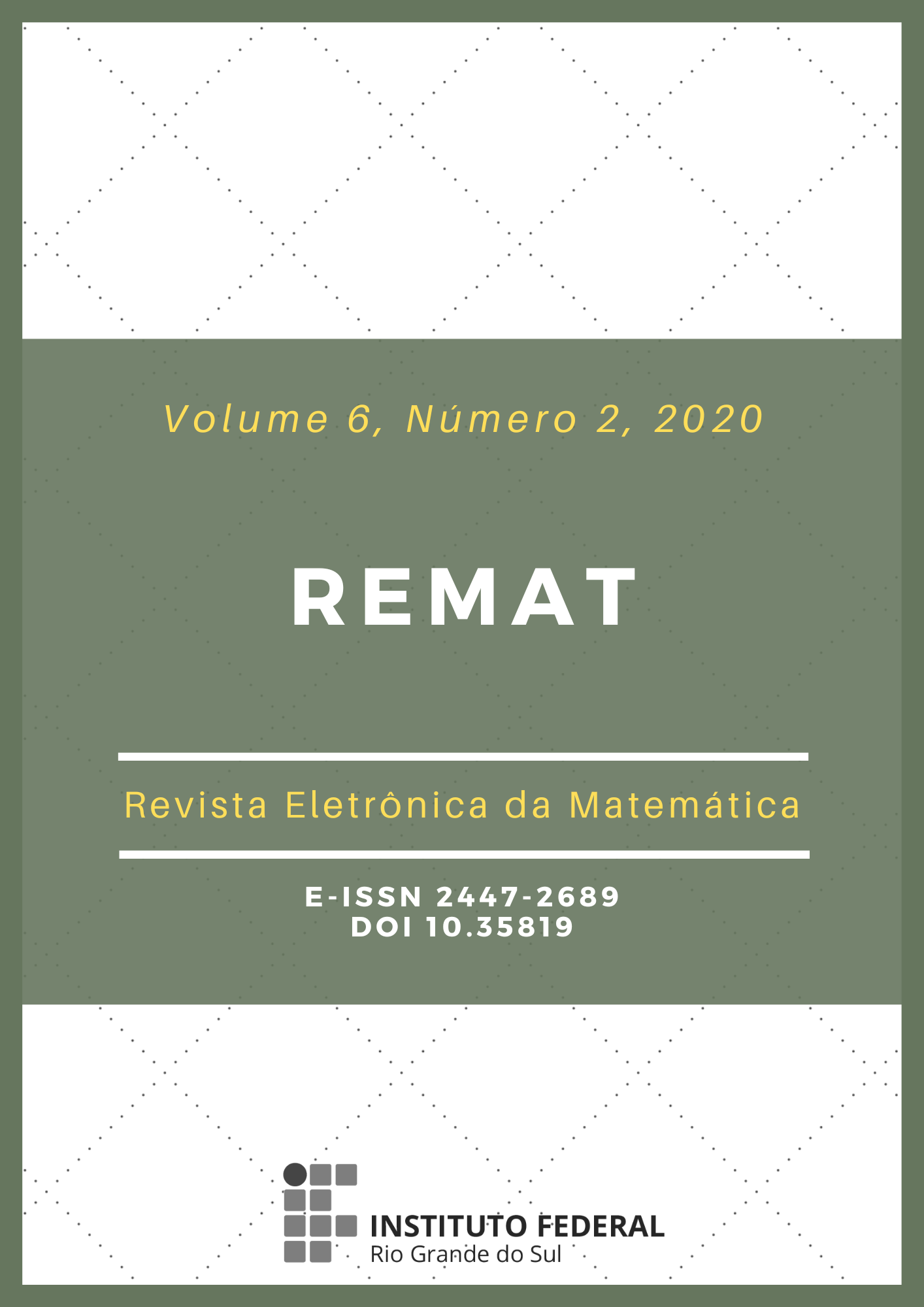PIBID Project and Special Educational Service: an experience with the use of games and manipulatives materials in the construction of Mathematics concepts by students
DOI:
https://doi.org/10.35819/remat2020v6i2id3965Keywords:
Special Education, Mathematics Education, Games, ManipulativesAbstract
This text emerges as a reflective product from a set of experiences lived within the scope of the Teaching Initiation Project (PIBID), that took place in the Special Educational Service (AEE) space. From the demands emerging from regular mathematics classes, the possibility of developing materials/classes that were subsidized in the use of games and manipulatives was considered. For this purpose, ideas that could support the construction and use of the materials described in this article were consulted in the literature. The theoretical basis used runs through characteristic elements in national legislation, which involves Special Education from the perspective of Inclusive Education and also in the use of games and manipulatives to promote reflective mathematical learning. From a methodology based on actions in the AEE, observations on the participants and notes in the field diary, it was possible to reflect, from a qualitative perspective, on the itinerary taken by the participating students, relating it to their contemplation before the objectives in advance elaborated. The performance of the project's actions also made it possible to reflect on the initial training of the mathematics teacher, regarding its appropriation of the ideas and ways of working pertinent to the AEE.
Downloads
References
BAPTISTA, C. R. Ação pedagógica e educação especial: a sala de recursos como prioridade na oferta de serviços especializados. Revista Brasileira de Educação Especial, v. 17, n. esp., p. 59-76, maio/ago. 2011. DOI: https://doi.org/10.1590/S1413-65382011000400006.
BOGDAN, R. C.; BIKLEN, S. K. Investigação qualitativa em educação. Trad.: ALVAREZ, Maria João; SANTOS, Sara Bahia dos; BAPTISTA, Telmo Mourinho. Porto/Portugal: Porto Editora, 1994.
BRABO, G. M. B. Formação docente inicial e o ensino ao aluno com deficiência em classe comum na perspectiva da educação inclusiva. 2013. 163 f. Tese (Doutorado em Educação) – Programa de Pós-Graduação em Educação, Universidade Federal do Rio Grande do Sul, Porto Alegre, 2013.
BRASIL. Casa Civil. Lei Nº 4.024, de 20 de dezembro de 1961. Fixa as Diretrizes e Bases da Educação Nacional. Diário Oficial da União, Brasília/DF, 27 dez. 1961.
BRASIL. Casa Civil. Lei Nº 5.962, de 11 de agosto de 1971. Fixa Diretrizes e Bases para o ensino de 1° e 2º graus, e dá outras providências. Diário Oficial da União, Brasília/DF, 12 ago. 1971.
BRASIL. Casa Civil. Lei Nº 9.394, de 20 de dezembro de 1996. Estabelece as diretrizes e bases da educação nacional. Diário Oficial da União, Brasília/DF, 23 dez. 1996.
BRASIL. Ministério da Educação. Política Nacional de Educação Especial na Perspectiva da Educação Inclusiva. Brasília/DF, jan. 2008. Disponível em: http://portal.mec.gov.br/arquivos/pdf/politicaeducespecial.pdf. Acesso em: abr. 2020.
BRASIL. Secretaria-Geral. Lei Nº 13.146, de 6 de julho de 2015. Institui a Lei Brasileira de Inclusão da Pessoa com Deficiência (Estatuto da Pessoa com Deficiência). Diário Oficial da União, Brasília/DF, 7 jul. 2015.
CORREA, J.; MACLEAN, M. Era uma vez... um vilão chamado matemática: um estudo intercultural da dificuldade atribuída à matemática. Psicologia: Reflexão e Crítica, Porto Alegre, v. 12, n. 1, p. 173-194, 1999. DOI: http://dx.doi.org/10.1590/S0102-79721999000100012.
FIORENTINI, D.; MIORIM, M. A. Uma reflexão sobre o uso de materiais concretos e jogos no Ensino de Matemática. Boletim da SBEM, São Paulo, ano 4, n. 7, 1990.
FIORENTINI. D.; LORENZATO, S. Investigação em educação matemática: percursos teóricos e metodológicos. 3. ed. Campinas: Editores Associados, 2009.
OLIVEIRA, C. H; TRINDADE, V. M. T; ROBAINA, J. V. L. Uso do console Xbox 360° com kinect no ensino de Matemática e Ciências. In: ENCONTRO REGIONAL DE ENSINO DE CIÊNCIAS, 2, 2018, Porto Alegre. Anais... Porto Alegre: Universidade Federal do Rio Grande do Sul, 2018. Disponível em: https://www.lume.ufrgs.br/bitstream/handle/10183/205986/001108988.pdf?sequence=1. Acesso em: abr. 2020.
PACHECO, M. B.; ANDREIS, G. da S. L. Causas das dificuldades de aprendizagem em Matemática: percepção de professores e estudantes do 3º ano do Ensino Médio. Revista Principia, João Pessoa, v. 1, n. 38, p. 105-119, fev. 2018. DOI: http://dx.doi.org/10.18265/1517-03062015v1n38p105-119.
PIOVEZANI, M. I. E. Formação de professores e o atendimento ao aluno com deficiência no ensino regular na perspectiva da educação inclusiva. 2013. 105 f. Dissertação (Mestrado em Educação) – Programa de Mestrado em Educação, Universidade Estadual do Oeste do Paraná, Cascavel, 2013.
SANTOS, V. de M. A relação e as dificuldades dos alunos com a matemática: um objeto de investigação. Zetetike, Campinas, v. 17, n. esp., 9 dez. 2009. DOI: https://doi.org/10.20396/zet.v17i0.8646794.
SANTOS, J. F. Atendimento educacional especializado para a educação infantil em redes municipais de ensino do estado do Rio Grande do Sul: Caxias do Sul, Porto Alegre, Santa Maria e Uruguaiana. 2017. 195 f. Dissertação (Mestrado em Educação) – Programa de Pós-Graduação em Educação, Universidade Federal do Rio Grande do Sul, Porto Alegre, 2017.
SILVEIRA, M. R. A. A dificuldade da Matemática no dizer do aluno: ressonâncias de sentido de um discurso. Revista Educação e Realidade, Porto Alegre, v. 36, n. 3, p. 761-779, set./dez. 2011. Disponível em: https://www.seer.ufrgs.br/educacaoerealidade/article/view/18480. Acesso em: abr. 2020.
SMOLE, K. S.; DINIZ, M. I.; PESSOA, N.; ISHIHARA, C. Cadernos do Mathema: Jogos de matemática de 1º a 3º ano. Porto Alegre: Artmed, 2008.
SOARES, M. A. L; CARVALHO, M. F. O professor e o aluno com deficiência. São Paulo: Cortez, 2012.
TATTO, F.; SCAPIN, I. J. Matemática: por que o nível elevado de rejeição? Revista de Ciências Humanas, Frederico Westphalen, v. 5. n. 5, 2004. Disponível em: http://revistas.fw.uri.br/index.php/revistadech/article/view/245. Acesso em: abr. 2020.
TIELLET, C. A.; FALKEMBACH, G. A. M.; COLLETO, N. M.; SANTOS, L. R.; RIBEIRO, P. S. Atividades Digitais: seu uso para o desenvolvimento de habilidades cognitivas. RENOTE: Revista Novas Tecnologias na Educação, Porto Alegre, v. 5, n. 1, jul. 2007. DOI: https://doi.org/10.22456/1679-1916.14152.
Downloads
Published
Issue
Section
License
Copyright (c) 2020 REMAT: Revista Eletrônica da Matemática

This work is licensed under a Creative Commons Attribution 4.0 International License.
REMAT retains the copyright of published articles, having the right to first publication of the work, mention of first publication in the journal in other published media and distribution of parts or of the work as a whole in order to promote the magazine.
This is an open access journal, which means that all content is available free of charge, at no cost to the user or his institution. Users are permitted to read, download, copy, distribute, print, search or link the full texts of the articles, or use them for any other legal purpose, without requesting prior permission from the magazine or the author. This statement is in accordance with the BOAI definition of open access.













 https://orcid.org/0000-0002-0893-7426
https://orcid.org/0000-0002-0893-7426


















